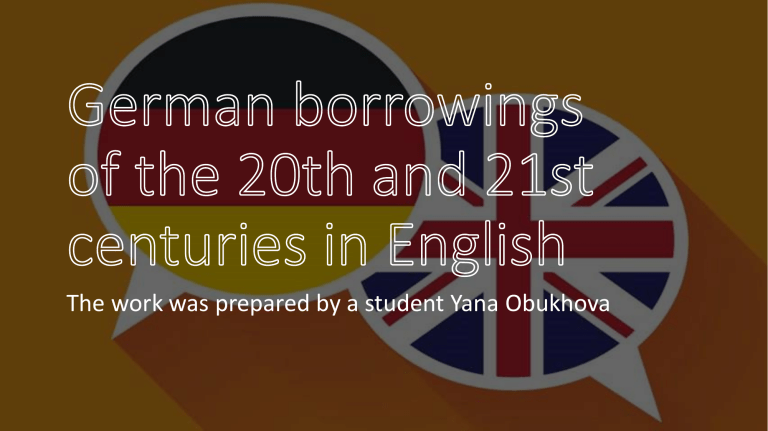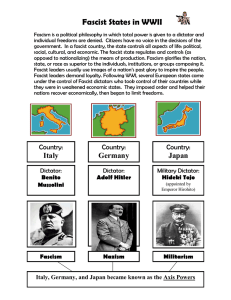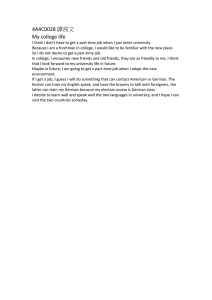
The work was prepared by a student Yana Obukhova When the German words came into the English speech? The next borrowing appeared in English already in the XVI century (lobby “hall, vestibule”). Massive borrowing of German words into English began only in the second half of the XVIII century (delicatessen “delicacies”, doppelganger “Ghost”, ersatz “surrogate”, schadenfreude “gloat”, dachshund “Dachshund”, kraut “cabbage”, hamburger “hamburger”, pumpernickel “rye bread”). German words in the 20th century The coup d'etat in Germany caused the emergence of new concepts in the socio-political life of the country. First of all, these are the names of positions of SS commanders: Fuhrer (Fuhrer, leader), gauleiter (Gauleiter, regional Governor), sturmmann (corporal), etc., as well as words and expressions that reflect the main realities of the fascist regime: Gestapo (Gestapo), Luftwaffe (Luftwaffe, German aviation during the fascist dictatorship), Wehrmacht (German armed forces during the Second world war), bunker (bomb shelter), Heil! (fascist greeting), Hitlerju-gend (fascist youth organization), SS-man (SS), hitlerite (Hitlerite), gas chamber (gas chamber), nazi (fascist), fascist (fascist), blitzkrieg (lightning war), etc. Interesting facts Kapellmeister Strudel The name of the leader of the Nazis, Hitler, began to be used as a household name. According to the rules of English grammar, it is used with an indefinite article and can have a plural (a hitler, hitlers). German words borrowed into English during the fascist dictatorship are now perceived as historicisms that reflect the political events of that time. Many of these words became internationalisms and appeared in other languages. Branches of using German words Significant influence of the German language is noticeable in the field of Mineralogy and Geology (quartz “quartz”, gangue “species”, feldspar “feldspar”, wolfram “Wolfram”, kobold “cobalt”), music (leitmotif “leitmotif”, kapellmeister “Kapellmeister”, waltz “waltz”, zither “zither”, yodel “yodel, singing in the Tyrolean way”, minnesinger “minnesin-ger”), literature (bildungsroman “romance of education”, Sturm und Drang “storm and onslaught”, Zeitgeist “Zeitgeist”, märchen “fairy tale”), history (führer, diktat, Gestapo, Nazi “fascist”), linguistics (umlaut, ablaut, schwa “neutral vowel”), philosophy (über-mensch “Superman”, weltschmerz “world sorrow”, weltan-schauung “worldview”) and psychology (gestalt, zeitgeber “time sensor”). Conclusion After the entry of German words into the lexical system of English, they obey the general laws of the development of this system. From the borrowed words in the language, words are fixed that mean necessary objects and phenomena. These words become common and are recorded in dictionaries. Thank you for your attention!

